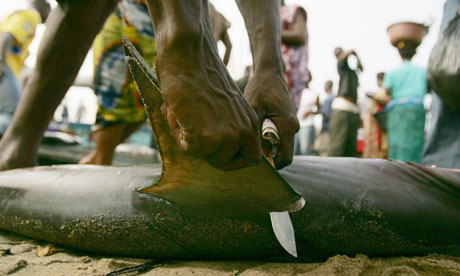Global shark conservation plan in the balance at landmark talks
Representatives from 50 nations have met to discuss the draft plan to ban shark finning and manage populations

The UK-backed draft plan to monitor and manage shark populations is under discussion at the first official meeting of signatories to a landmark memorandum of understanding on the Conservation of Migratory Sharks. Photograph: Kambou Sia/AFP/Getty Images
A ban on shark finning and the adoption of a global shark conservationplan is being sought at a meeting of more than 50 countries in Bonn this week.
The UK-backed draft plan to monitor and manage shark populations is under discussion at the first official meeting of signatories to a landmark memorandum of understanding on the Conservation of Migratory Species (CMS). A decision is expected on Thursday.
The market for shark fins, used in shark fin soup, is a major threat to shark populations, with fins among the most expensive fish products in the world at $740 (£456) per kilo. The high value of fins compared to the usually lower value of the rest of the shark meat creates an economic incentive for the wasteful practice of slicing off a shark's fins and discarding the body at sea. Several hotel chains in Asia, includingShangri-La and Peninsula, have banned shark fin soup as a result of campaigning for an end to finning.
Shark finning has been banned by more than 60 fishing nations as well as the European Union. But in the EU and in many countries, permits for processing on board can be obtained in some cases, whereby shark fins can be removed from the carcasses and stored separately. A vote in the European parliament's committee on fisheries voted on the issue on 19 September, but failed to close the loopholes.
Sandrine Polti, shark policy adviser to the Pew Environment Group, said: "Pew strongly supports the European commission's proposal [made in 2011, to end the permits] and urges all parliamentarians to endorse a strict EU policy against removing shark fins at sea, without any more exceptions,"
The plan under discussion at this week's CMS would commit countries to: "Where not already in place, consider enacting legislation or regulations requiring sharks to be landed with each fin naturally attached."
Officials from the UK hope to strengthen the language so as to achieve a global, watertight and exception-free commitment to a ban on shark finning. The fisheries minister, Richard Benyon, plunged into a tank of sharks – behind a net – at the Sealife London Aquarium in August to highlight the UK's opposition to shark finning.
• Stanley Johnson's new book, Where the Wild Things Were: Travels of a Conservationist, is published by Stacey International
No hay comentarios:
Publicar un comentario